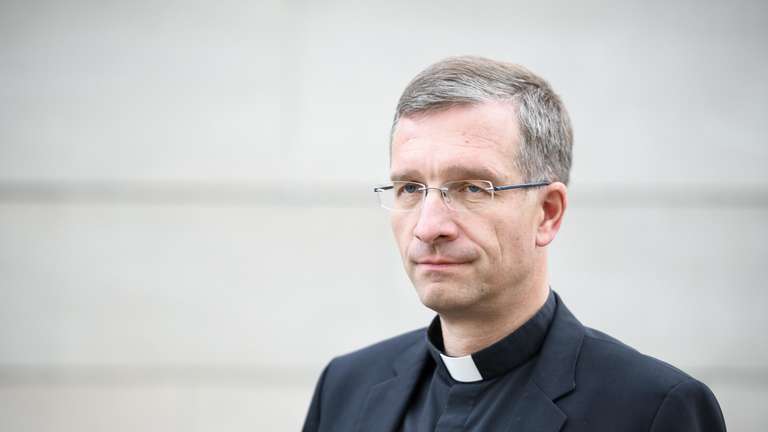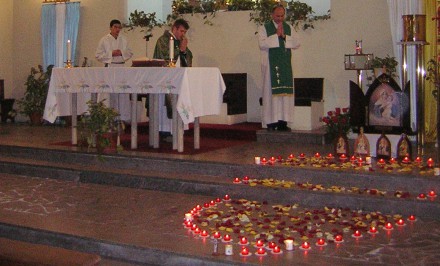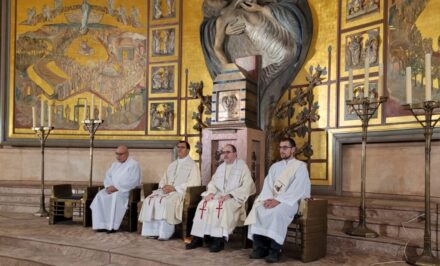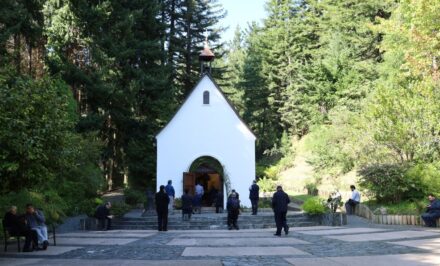GERMANY, Editorial Team schoenstatt.org / Press release of the diocese of Fulda •
Where tensions and pressures are clearly experienced in the Church, the seriousness of synodality becomes evident, emphasizes Fulda’s Bishop Dr. Michael Gerber. He sees the fifth and last synodal assembly of the Catholic Church in Germany as a test of a synodal church. In a statement, Bishop Gerber formulates his expectations for the assembly, which will convene in Frankfurt from Thursday to Saturday. —
“Synodality lives from listening, from taking my counterpart seriously and from trying to understand more deeply what the concern is,” says Bishop Gerber in his statement before the start of the synodal assembly, “Let us listen. To the word of those who have experienced deep hurt in our church, to the sometimes very edgy message of the Gospel, and to the tradition of the church that holds both treasure and burden.”
Jesus criticized fear and small faith among his disciples, the bishop of Fulda said. “Let us practice an attitude that is willing to critically question our own ways of thinking. I am convinced that God’s action is revealed precisely in those moments experienced as exciting.”
Test in Frankfurt
Bishop Gerber understands the coming days in Frankfurt as a test of a synodal church: synodals and especially bishops would have to ask themselves what the vision looks like that guides them. A central document of the universal church synod makes a clear specification here: “The vision of a church capable of radical inclusion, shared belonging and deep hospitality, as Jesus teaches, is at the heart of the synodal process,” Gerber quotes from the working paper titled “Enlarge the space of your tent.”
Bishop Gerber formulates clear expectations for the course of the assembly in Frankfurt. Literally, the bishop says:
- From Frankfurt the signal must go out: You, who in various ways experience yourselves marginalized in the Church, you belong to it. Together with you we ask: What treasure do you bring that the Church needs in order to live its mission authentically? Jesus calls people in and with all their imperfections that remain throughout life. This paradox of the Gospel must be lived out as a church, especially today.
- The message must go out from Frankfurt: As bishops, we are aware of what moves many committed people in our church. We actively bring this into the discourse and decision-making processes of the universal church. Let us not be afraid of the tension that arises in the process. A look at the Acts of the Apostles shows us that tension is often the starting point for decisive growth processes in the church.
- In this tension we allow ourselves to be challenged by the constructive examination of church doctrine and tradition as well as by the power of theological argument as well as by a differentiated consideration of the “signs of the times”.
Accompanying prayers on the third Sunday of Lent
In a joint letter, Bishop Gerber and the chairman of the Catholic Council in the Diocese of Fulda, Steffen Flicker, invite people to pray in a special way for the present journey of the Church during the services on the third Sunday of Lent (March 11-12). The occasion is not only the conclusion of the three-year Synodal Way. Rather, during these weeks the conferences of the worldwide synodal process are also meeting on all continents with the representatives of the bishops’ conferences and other delegates. In addition, next Monday Pope Francis will celebrate the tenth anniversary of his election as pope.
“Let us ask for a heart that is open to what “magis”, to what depth and breadth the Lord now wants to lead the Church, and also me personally. In this sense, I am grateful to all who accompany us in prayer during these days,” Bishop Gerber said.
Taking the other person and his or her experience and point of view seriously.
Sounds uncomfortable. It is.
Sounds like Kentenich. It is Kentenich.
Bishop Dr. Michael Gerber belongs to the Schoenstatt Movement.
- Michael Gerber has been Bishop of Fulda since March 31, 2019. Previously, he was auxiliary bishop in the archdiocese of Freiburg.
- Within the German Bishops’ Conference, he is chairman of the Commission for Spiritual Vocations and Church Ministries (Commission IV).
- During the spring plenary meeting of the German Bishops’ Conference, he was also elected as a member of a new episcopal expert group for the processing and prevention of cases of sexual abuse and experiences of violence.
- As a member of the Youth Commission of the German Bishops’ Conference, the bishop is the contact bishop for the associations of the Boy Scouts and Girl Guides.
- At the Synodal Way, Bishop Gerber is a member of Synodal Forum 3 “Women in Ministries and Offices in the Church.”
Press release
Original: German. Translation: Maria Fischer @schoenstatt.org
















Now that the German Synod has concluded with numerous decisions your question, Curtis, is very appropriate and needs to be answered. We pray for the German Bishops that in humility they open their hearts to the Holy Spirit and evaluate their actions and subsequent consequences for Germany and the entire Church. Did they really put their ear to the heart of God or did they only put their hand on the pulse of the times?
“Expanding the tent” , a biblical quote and title of the Working Document for the entire church… Did you read it?
You are all aware that this is not just Germany, but that you are talking about the Synodal Church as such, a great initiative of the Pope, Christ`s representative on earth, with particpation of hundreds and thousands of Christians? Of course you actively participated in the process, or say, worked from within for the renewal of the church?
And your knowledge of the German Synodal Way comes from profound studies of its documents and sessions? And your knowledge of the universal synodal approch comes from profoundly and openly reading the document, after participating in the diocesan process?
Does expanding our tent come at a cost? What’s the cost? A splitting of the Church, a modern church, a traditional church? Every movement, every religious congregation wrestles with this. The difference with this synodal process is that it calls into question laws which our built into nature, a denial of what is real, man and woman, marriage, and our very existence as humans for the sake of hospitality.